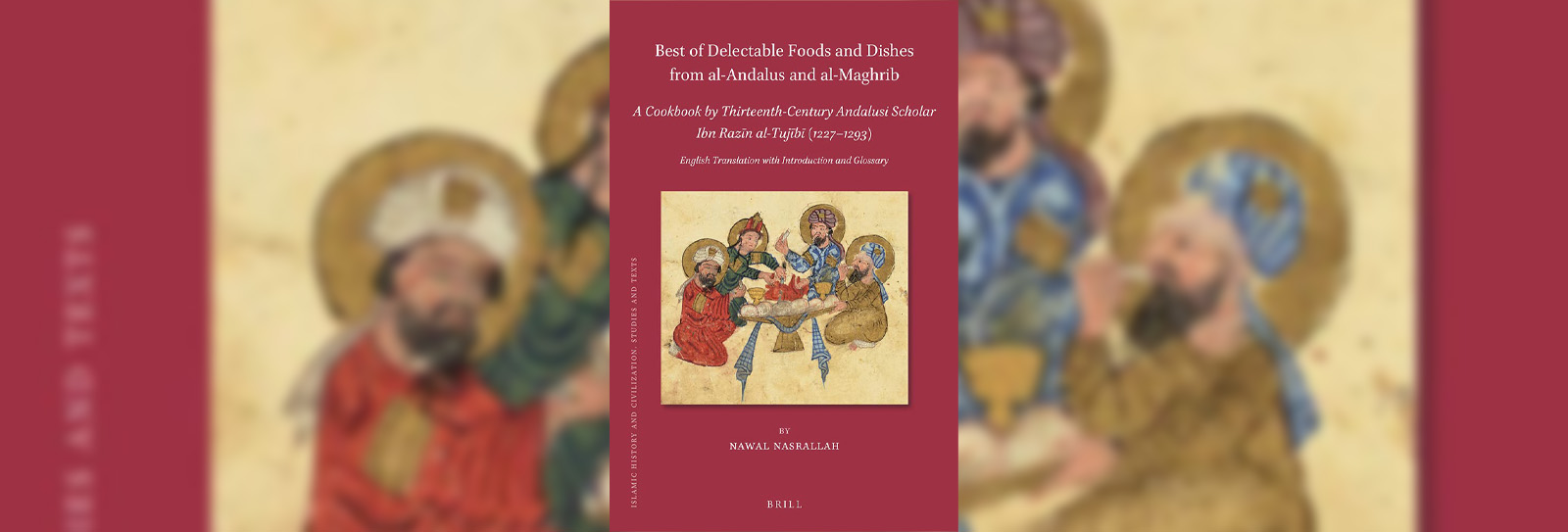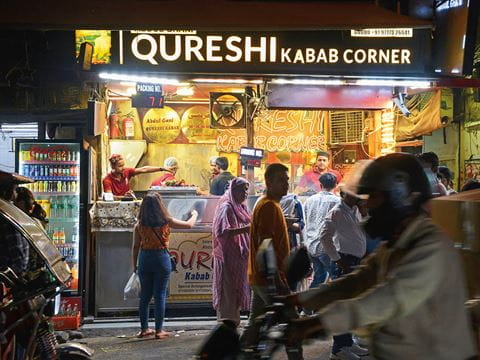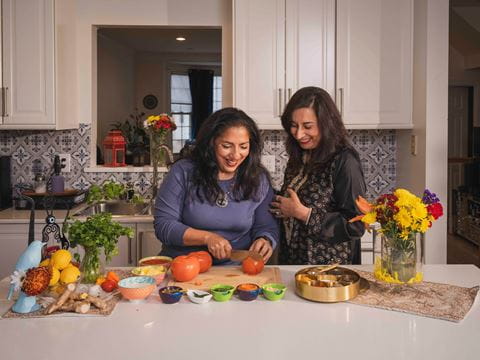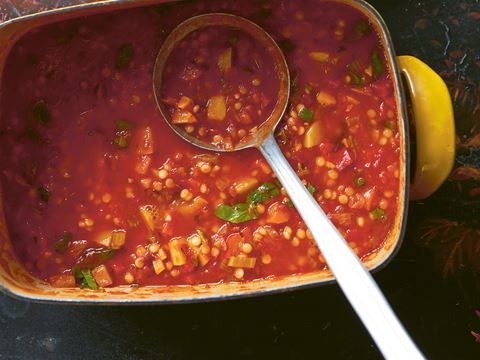
Refuge in Recipes: The Research Journey of Nawal Nasrallah
It was time for the family to sit down for dinner at Nawal Nasrallah’s home in Bloomington, Indiana. Nasrallah had made her 18-year-old daughter Iba’s favorite dish, Iraqi-style eggplant biryani, in honor of the college acceptance letter Iba had just received. Iba spooned the biryani onto her plate, took a bite and burst into tears. “Where am I going to find food like this at school?” she asked.
It was time for the family to sit down for dinner at Nawal Nasrallah’s home in Bloomington, Indiana. Nasrallah had made her 18-year-old daughter, Iba’s, favorite dish, Iraqi-style eggplant biryani, in honor of the college acceptance letter Iba had just received. Iba spooned the biryani onto her plate, took a bite and burst into tears. “Where am I going to find food like this at school?” she asked.
“When I make these recipes accessible again, it almost feels like I am bringing their creators back to the world as well.”
—Nawal Nasrallah
Nasrallah points to that moment more than 20 years ago to show how the power of food does so much more than provide sustenance. “It connects us deeply,” she explains—from families to friends, communities and cultures. For Nasrallah, this realization came to her in the early 1990s while she was building a life half a world away from Iraq, where she had grown up, earned a master’s degree in English literature and taught at the University of Baghdad and the University of Mosul. In 1990 she followed her husband to the American Midwest while he pursued his doctorate. The Gulf War was beginning as she and the couple’s three children departed Baghdad.
It did not take long for her to discover that most people in Bloomington knew little about Iraqi culture or its culinary history that reaches back thousands of years. “I started making traditional dishes as a way to show people other sides of us,” she says. “Then I started to wonder where the dishes had come from.”
Not finding cookbooks that could provide both the recipes and the historical context she was looking for, Nasrallah decided to start making her own. She started by gathering Iraqi recipes she and her family enjoyed. But with her research background, she soon was delving into Arabic texts that were centuries old, some reaching back to the 10th century CE, scavenging for the earliest versions of dishes, or at least trying to get close to their primary sources. “I started wondering where all these traditions in our food came from,” says Nasrallah. “That was the spark. Suddenly, I had a project.”
She had plenty to work with. Some of the world’s first writing, recorded on Akkadian cuneiform tablets in about 1700 BCE, was a set of recipes, she points out. Although other academics had studied these instructions for preparing stews and baking bread, Nasrallah also worked with the oldest Arabic texts she could find, some of which had never been translated to English. Working from Indiana, she witnessed the 6,000-year-old roots of her own Iraqi culture begin to coalesce on the page. In person, via photocopies and later PDF files, she found instructions for countless types of bread, arrays of eggplant dishes, myriad ways to make hummus and more.
Her work was well under way when, in 1994, she was diagnosed with breast cancer. Two years later her youngest son, Bilal, age 13, suffered a sudden, fatal brain hemorrhage. “I am so thankful I had my work then,” Nasrallah says, her voice softening. “It was a safe place. It helped me survive.”
In the weeks and months afterward, Nasrallah found solace in the university libraries in Indiana and Boston, where in 2000 the family relocated. “I retreated to another time,” she says. “I couldn’t change what had happened in my life, but I could rescue someone’s lost way of making baklava.”
Some of the world’s first writing, recorded on Akkadian cuneiform tablets in about 1700 BCE, was a set of recipes.
Her research resulted in Delights From the Garden of Eden, 664 pages with more than 400 recipes that traced the history of Iraqi cuisine, edited by her husband and in 2003 self-published after more than 20 rejections from publishers. Copies were printed only after they’d been ordered, yet they started selling briskly—and then publishers took note.
In 2007 the book was picked up and published by Equinox Publishing, and the first edition won the Gourmand World Cookbook Special Jury Award that same year. In 2013 Saveur magazine counted the second edition one of the year’s top cookbooks. But her highest compliments came from Nasrallah’s toughest audience: fellow Arab chefs. They praised the work too, and they passed their copies among friends and sent her feedback about their own recipes. “The best feeling was hearing about how much someone liked a recipe, how their family enjoyed it,” she says. “I found meaning again in this work. Food connects us deeply, as family, as community. I wanted to understand everything I could about where our traditions come from.”
The validation from her peers inspired Nasrallah further, and most recently to track down antique copies of what became her most-recent translation, published in September 2021, Best of Delectable Foods and Dishes From al-Andalus and al-Maghrib: A Cookbook by 13th Century Andalusi Scholar Ibn Razīn al-Tujībī. Along the way, she even discovered a lost section of the scholar and poet’s cookbook, composed in Tunis around 1260 CE, making her translation the most authoritative edition to appear in 400 years.
Since the 1600s the known copies of al-Tujībī’s cookbook ended in the middle of a recipe for carrots. While 475 of his preceding recipes had survived, sections on vegetables, sauces, pickling and more had long been regarded as lost. Al-Tujībī is believed by most academic historians to have written many books, but only his cookbook has survived. As she worked, Nasrallah says she “didn’t feel right about presenting his book with missing parts,” but there was, she thought, no alternative.
That changed one day in July 2018. At the British Library, curator of Arabic scientific texts Bink Hallum found, tucked into a medieval pharmacological manuscript, some 200 pages of a cookbook. He sent a copy to Nasrallah, whom he knew was working on translating the known text into English.
Nasrallah says her heart started hammering as she stared at the scanned document that opened on her computer screen. Now the resulting translation restores the original, which al-Tujībī had compiled to preserve the food culture of his native al-Andalus, Arab Iberia, after his flight from Spanish armies to North Africa. “I spend years with these writers, I really bond with them, and I want to present them the way they deserve to be,” says Nasrallah. “When I make these recipes accessible again, it almost feels like I am bringing their creators back to the world as well.”
By the time Nasrallah had turned to al-Tujībī’s work, she had also produced, in 2007, the first English translation of Kitab al-tabikh, a 10th-century work from Abbasid Iraq that is believed to be the oldest-surviving Arabic cookbook, and in 2017, Treasure Trove of Benefits and Variety at the Table, a 14th-century Egyptian work that also included recipes adjusted for the modern kitchen.
At present she is translating the only other known 13th-century Andalusi cookbook, written by an unknown author. After that, she says, she hopes to write a comprehensive history of Arab cuisine. “It’s a way of keeping these customs alive, and this gives the people who first put these recipes together a new life as well,” she says.
The recipes still also help keep her family bonds strong. She and her husband now visit Iba, who lives in London, at least once a year, and Nasrallah says she still makes Iba her favorite Iraqi biryani with eggplant. Every time, Nasrallah says, she remembers the day of the college admission letter. “I am in that moment whenever I make that dish, both here and back then,” Nasrallah says. “I still view this as my sanctuary.”
You may also be interested in...

From Sultan’s Kitchen to Delhi’s Streets: Ni‘matnāma Lives On
Food
A sultan’s 500-year-old cookbook still ripples across South Asia, from kitchens to street stalls to celebratory tables, preserving centuries of technique and taste.
How a Quest To Perfect Butter Chicken Rekindled Memories and Heritage
Food
What begins as a lesson in a beloved recipe becomes a journey through diaspora, friendship and the scents that tie us to places we’ve never lived.
Couscous for Lunch or Dinner: Algerian Pasta Soup With Labneh
Food
The berkoukes are giant couscous balls cooked into soups and stews, with little differentiation across North Africa and the Levant.

